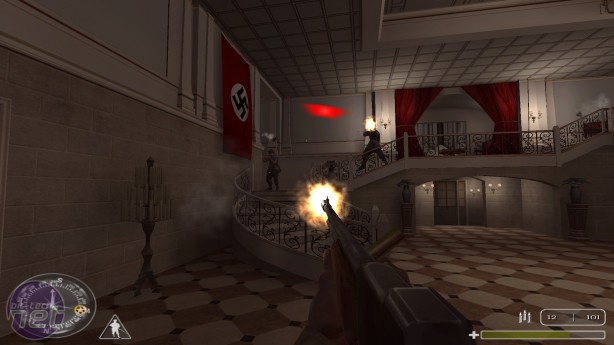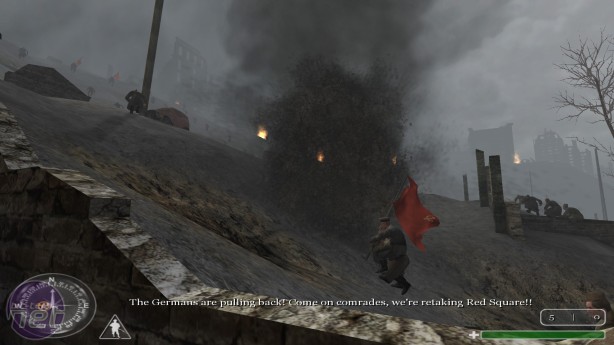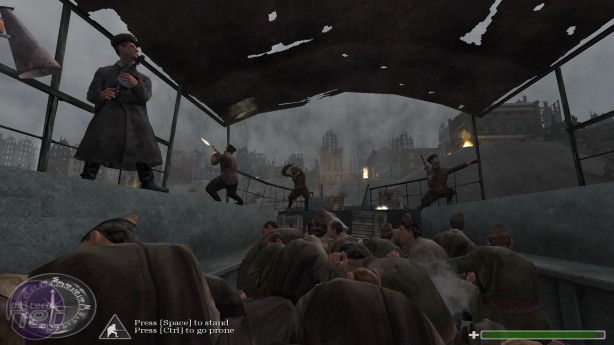
But these scenes aren't the most enjoyable aspect of Call of Duty (if enjoyable is the right word for the sensation of witnessing the awesome, terrible destructive power of war). The best missions are probably those which ask you to defend an objective, specifically the British effort to hold Pegasus Bridge, and the ridiculously frantic siege of Pavlov's House, the imposing Russian tenement building listed as a fortress on German military maps. Even on Regular difficulty, the latter is a ferocious tooth and nail scrap that by its end will often see you alone, braced against a wall, fighting off three or four Germans with the butt of your Ppsh submachinegun.
Even the more traditionally structured missions, such as your lone assault on a German dam, are still enjoyable thanks to the immediate, kinetic nature of the game. Wehrmacht soldiers can round a corner and fill you with enough lead to line an X-ray screen in less than a second, demanding instantaneous reaction. Should you come out victorious, then poor old Jerry folds to the dirt with a "fthlump" noise that still satisfies today. Also, there's always one or two more than you expect, so even when you know what's coming, it still manages to surprise.
What's truly remarkable about Call of Duty is how straight and to the point it is compared to the turgid jingoistic nonsense of the more recent games. Admittedly, the setting helps, but there are no long, silly speeches that attempt to justify your actions, or attempts to imbibe sympathetic character into its grim-faced soldier men. Instead Call of Duty is urgent and pragmatic. It's a war, here is your objective, get it done. And when you've done what you must, it carries on, no manly slapping of backs, or lyrical waxings about heading off to the pub. Just a quick fade-to-black, and onto the next mission.
This gulf in attitude is most evident in how Call of Duty treats your comrades. In the new games the death of a fellow soldier is accompanied by the cursing of God, oaths of vengeance and an orchestral score so loud and sweeping it makes you wonder how they managed to sneak past enemy lines in the first place. Call of Duty spares no such sympathy for your brethren. You'll be raiding a Bavarian mansion house, side by side, only to see three of your comrades mowed down by machinegun fire as he moves in to clear the next room.
Moreover, during the daring British night-raid of the Battleship Tirpitz, the original Captain Price, who is now Call of Duty royalty, can die. You might not even see it happen, only once you've got back to your boat after setting the charges, might you realise you've been fighting alone for the past fifteen minutes. "He was a good man," says Sergeant Waters bluntly, before proceeding with the extraction.
These deaths, abrupt, unceremonious, wasteful, are all the more affecting because the game is so dismissive of the grievous loss of humanity. It moves on, and you must move on with it. There's no time to worry about death! This is a war, damn it! The only time Call of Duty pauses for breath is when you step too close to an explosion. You're thrown to the ground, the screen blurs and all sound is sucked from the world. Here it lends you a few moments to survey the chaos and horror surrounding you, without commentary or judgment or eulogy. The men cowering behind the wall in front of you, the artillery bursts ripping up the ground like paper, the dead man lying in the crater beside you, an inch of space separating your fate from his.
This isn't to say Call of Duty is some insightful war commentary, that would be absurd. It is ultimately a playable Hollywood Blockbuster, the game that let you partake in that scene from that film or that TV show, to feel a tiny fraction of the fear, awe and adrenaline that the real event must have caused. But it also manages to be frank about the sad reality, and does its utmost to avoid exploitation and sentimentality, and for both these things it is worthy of remembrance.
Even the more traditionally structured missions, such as your lone assault on a German dam, are still enjoyable thanks to the immediate, kinetic nature of the game. Wehrmacht soldiers can round a corner and fill you with enough lead to line an X-ray screen in less than a second, demanding instantaneous reaction. Should you come out victorious, then poor old Jerry folds to the dirt with a "fthlump" noise that still satisfies today. Also, there's always one or two more than you expect, so even when you know what's coming, it still manages to surprise.
What's truly remarkable about Call of Duty is how straight and to the point it is compared to the turgid jingoistic nonsense of the more recent games. Admittedly, the setting helps, but there are no long, silly speeches that attempt to justify your actions, or attempts to imbibe sympathetic character into its grim-faced soldier men. Instead Call of Duty is urgent and pragmatic. It's a war, here is your objective, get it done. And when you've done what you must, it carries on, no manly slapping of backs, or lyrical waxings about heading off to the pub. Just a quick fade-to-black, and onto the next mission.
This gulf in attitude is most evident in how Call of Duty treats your comrades. In the new games the death of a fellow soldier is accompanied by the cursing of God, oaths of vengeance and an orchestral score so loud and sweeping it makes you wonder how they managed to sneak past enemy lines in the first place. Call of Duty spares no such sympathy for your brethren. You'll be raiding a Bavarian mansion house, side by side, only to see three of your comrades mowed down by machinegun fire as he moves in to clear the next room.
Moreover, during the daring British night-raid of the Battleship Tirpitz, the original Captain Price, who is now Call of Duty royalty, can die. You might not even see it happen, only once you've got back to your boat after setting the charges, might you realise you've been fighting alone for the past fifteen minutes. "He was a good man," says Sergeant Waters bluntly, before proceeding with the extraction.
These deaths, abrupt, unceremonious, wasteful, are all the more affecting because the game is so dismissive of the grievous loss of humanity. It moves on, and you must move on with it. There's no time to worry about death! This is a war, damn it! The only time Call of Duty pauses for breath is when you step too close to an explosion. You're thrown to the ground, the screen blurs and all sound is sucked from the world. Here it lends you a few moments to survey the chaos and horror surrounding you, without commentary or judgment or eulogy. The men cowering behind the wall in front of you, the artillery bursts ripping up the ground like paper, the dead man lying in the crater beside you, an inch of space separating your fate from his.
This isn't to say Call of Duty is some insightful war commentary, that would be absurd. It is ultimately a playable Hollywood Blockbuster, the game that let you partake in that scene from that film or that TV show, to feel a tiny fraction of the fear, awe and adrenaline that the real event must have caused. But it also manages to be frank about the sad reality, and does its utmost to avoid exploitation and sentimentality, and for both these things it is worthy of remembrance.

MSI MPG Velox 100R Chassis Review
October 14 2021 | 15:04












Want to comment? Please log in.